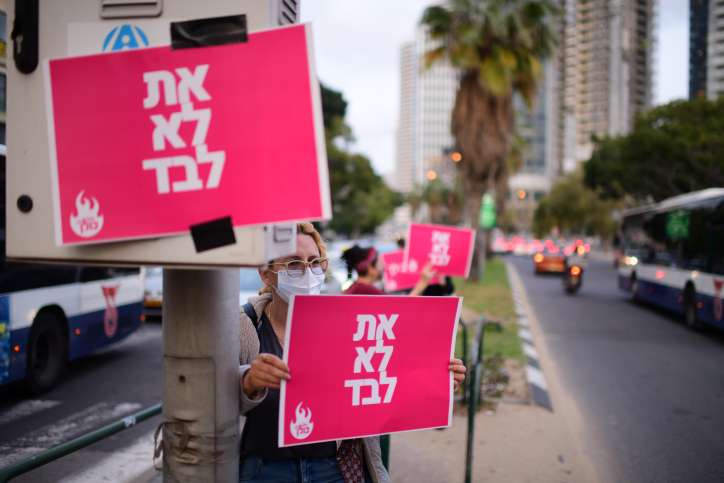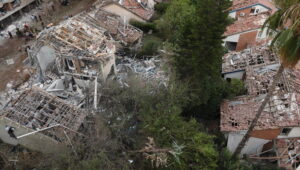I was recently assaulted by someone whom I used to trust and who actually lived with me, caring for my children. In the hospital, they asked, “Did a man do it to you?” I said, “No, it was a woman.” They then added, “A Palestinian woman?” I chuckled and replied, “No, a religious Jewish woman.” Actually, the doctors who operated on me and helped me recover were Arab Muslims, but the person who put me in this position was a religious Jewish woman.
People look at me in total shock. At work, most assumed the person who did this to me had to be an Iranian agent. After all, I am on Iran’s hit list for journalists they want dead. I founded a center called the Dona Gracia Center for Diplomacy, where Dr. Mordechai Kedar, a prominent scholar who is also on Iran’s hit list and is blamed for anti-regime protests, sits on our board. In my articles, I frequently interview Hamid Mutashir, an Ahwaz dissident that the Iranian regime also blames for the protests. I also speak often to Azerbaijani dissident Ahmed Obali, who was assaulted in his hotel room in an attack that many believe Iran was responsible for. So it’s not unreasonable for people to think that Iran got to me, too. But no, an Israeli religious Jewish nanny did their dirty work for them.
Many may wonder how such a thing could happen. It happened because I am a widow and single mom of three small children, all of whom have severe problems. I just cannot manage them and work alone. So, I had a live-in nanny, who worked for me around the clock. But when her mother got sick, the nanny informed me that my late husband’s mother had told her to “make a mess of your home” before leaving, adding that she hoped to see me “end up disabled in the hospital.” Shortly after this insult, the nanny left me in the lurch by failing to pick up the children from school while I was in an important meeting. I wanted to fire her, but my late husband’s father convinced me otherwise.
I told the nanny to take a vacation, hoping that her hostility was just a side effect of stress over his own mother, and that she’d return with a improved attitude.
When she returned, I asked her to take my daughter and buy Hanukkah gifts. She returned with far fewer than I had requested, but somehow all the money had been spent. Still, I hesitated to fire her due to my father-in-law’s position. Meanwhile, another nanny who works for us began to look through her things, suspecting that she was a thief. A few days later, when the mad nanny returned, she saw things were in a different order and went ballistic. She called both me and the other nanny idiots and thieves. She called the other nanny in the middle of the night to scream at her. She demanded that I fire the other nanny. I refused. She then beat me in the stomach and in the leg. I tried to call the police. She grabbed my phone and called me mentally ill, and then tried to wake up my eight-year-old daughter so she would witness everything.
I knew I had to intervene to stop her from making my daughter witness such a crime. She began to calm down and beg to keep her job, so even though I was in great pain, I agreed and sat down to have a drink and a chat with this women who had just assaulted me. For the sake of my daughter. I went to bed, but couldn’t sleep. The pain was too great. In the morning, I told my daughter, “Rush to grandma, hurry, go.” Though I despised grandma, I wanted her to be safe. I returned to bed, petrified and unsure what to do. That woman was still in my house. It was the other nanny who kicked the mad one out of the home later that morning. Though I was badly wounded, I was in too much shock and failed to go to a hospital till the next morning. There, I discovered that my spine was fractured in the assault.
For one week I was hospitalized, an invalid exactly like this nanny had wished upon me.
An Arab nurse discouraged me from reporting the bad nanny to the police, claiming that the police here don’t do anything to help victims. My late husband’s parents also discouraged me from going to the police, saying that the nanny would leave my life quietly if I didn’t make a fuss, but would cause me problems otherwise. The nanny who assaulted me also sent me threatening messages, promising to do just that if I reported her to the police.
But after I underwent surgery and suffered one week in a hospital bed, unable to get up even to go to the bathroom, let alone take cover if there was another terrorist rocket attack, I decided to pursue justice despite the discouragement I had received. So, from my hospital bed, I filled out the initial police report. After I was released from the hospital, I proceeded to the police station to finalize the report. That was followed by a court appearance, where the judge refused to give me a restraining order right away, claiming that the problematic nanny’s belongings had to first be taken out of my home.
I had two options: Allow the nanny who assaulted me to enter my home with a police officer, or let a mutual contact bring that nanny her things. By that point, I was diagnosed with complex PTSD, so I decided it would be toxic for my mental health for her to ever enter my home again. I instead permitted my late husband’s father to bring her things to her. In the end, my late husband’s mother did it, and on the way out said, “I don’t care about you or how you feel. I will invite whoever I want into my home.” In other words, the mad nanny would still have access to my children when they were visiting the home of their grandmother.
By that point, Welfare Services had reduced me to joint custody of the children with my late husband’s parents, as I was too disabled from the physical assault to fully care for them on my own, my husband is six feet under and as an immigrant, I have no other family in the State of Israel. I still have the kids three days a week, but the grandparents were given four days, during which time the nanny could potentially see the children and thus cause me great damage. I knew I had to act.
A day later, with the limited energy that I had while recovering from a physical assault, I paid a high-powered attorney to get me a restraining order, as I heard from someone in Israel’s Welfare Services that no one here takes you seriously about getting a restraining order if you don’t come with an attorney. If you have money, you can fight for justice. But if you are poor, the system doesn’t have time for you, and lets the perpetrators off the hook. But even for those with the money to hire an attorney, it is an uphill struggle.
My attorney advised me to pursue a mutually agreed restraining order, informing me that even some rape victims “fail to get restraining orders against their rapists unless the rapist consents to a mutually agreed restraining order. The court will only issue strong restraining orders if one is a victim of systematic domestic violence.” I was in shock. Is Israel really a Western country? Why do I need the consent of the person who attacked me to get a restraining order?
Fortunately, the nanny consented with the help of my lawyer, so I got my mutually agreed restraining order and then sent it to both grandparents, hoping they would honor it and not give the nanny access to my children. But I’m not optimistic, and legally, there’s little to be done.
It is exceedingly difficult to prove violations in the Israeli legal system, allowing perpetrators to more often than not get away with their crimes. Time will tell if the process I’ve gone through will get the authorities to act on my behalf. What I can say is that being physically assaulted in the Jewish state basically turned my world upside down. After experiencing the pathetic manner in which the Israeli legal system behaves toward the weak and unfortunate, I have come to realize that I’m not in Kansas anymore. Israel is just another Middle Eastern country. Maybe we are still better than our neighbors, but Israel is 20-30 years behind the US and Europe when it comes to helping assault victims fight for justice.














